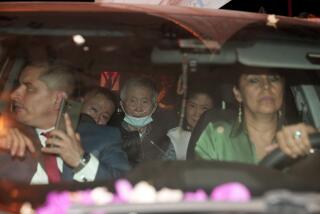OAS Reserved as Fujimori Vows Reforms
- Share via
NASSAU, Bahamas — Peruvian President Alberto Fujimori on Monday dramatically defended his suspension of Peru’s democratic system but promised to accelerate constitutional reforms and the restoration of an elected government.
But the response from regional foreign ministers gathered here for a general meeting of the Organization of American States was cautious and muted as they moved into a private session to decide on a formal reaction.
Most delegates agreed with U.S. Deputy Secretary of State Lawrence S. Eagleburger that Fujimori’s speech was “clearly movement forward,” but several echoed the remark of a Grenada delegate, made in the middle of the Peruvian’s presentation--that “this man hates democracy.” Much of the early reaction was summed up by a senior U.S. diplomat: “The crisis isn’t over.”
Many delegates anticipated the formal reaction by predicting that the foreign ministers would praise Fujimori’s visit and note his concessions but call on him to continue negotiations with the OAS for more and faster progress or face new sanctions.
In his formal response, Eagleburger made such a recommendation, saying that Fujimori’s speech contained promising elements but that “the devil is in the details.” The OAS, Eagleburger said, should continue a dialogue with Peru “to assure those details . . . assure a real return to democracy.”
Fujimori’s unscheduled appearance was aimed at heading off renewed OAS condemnation, including a recommendation of severe economic penalties, of his April 5 suspension of Peru’s constitution, dissolution of the legislature and imposition of near-martial law.
In earlier actions, the OAS had blasted Fujimori for staging “a self-coup” and implementing a military-supported dictatorship, and the organization called on its members to cut off economic aid.
The United States, as a result, suspended $167 million in aid, and Congress cut off all military aid not related to drug enforcement.
Fujimori’s decision to fly here and announce some concessions came after threats Saturday from a special OAS committee, meeting in Lima, that more sanctions were planned, including a cutoff of loans and other economic aid from the World Bank and other financial institutions.
Although the bulk of the president’s 40-minute speech, delivered in the overheated and crowded ballroom of a beachside luxury hotel, was a loud and determined justification of his actions--most of it heard before--there were some noted shifts from his previous statements.
The major compromise was the dropping of a lengthy schedule for a restoration of some sort of democratic system that would have stretched well into 1993. He also deleted from his text a call for a plebiscite on his approach originally set for July 5. The OAS had opposed such a vote on grounds that it would allow Fujimori to rule dictatorially and delay a quick restoration of democracy.
Instead, Fujimori said he would accept an OAS demand for election of a constituent assembly within “no more than five months” to draft a new constitution. Until Monday, he had flatly refused to allow such an elected assembly and indicated that total democratic restoration would take years.
After Fujimori’s speech, one U.S. official typified the determination of those present to find something positive in it. “It was very important that he came,” the official said. “If five or three years ago a democracy was overthrown, there would have been no such visit. . . . So it was important that he felt he had to come here.”
More to Read
Sign up for Essential California
The most important California stories and recommendations in your inbox every morning.
You may occasionally receive promotional content from the Los Angeles Times.













